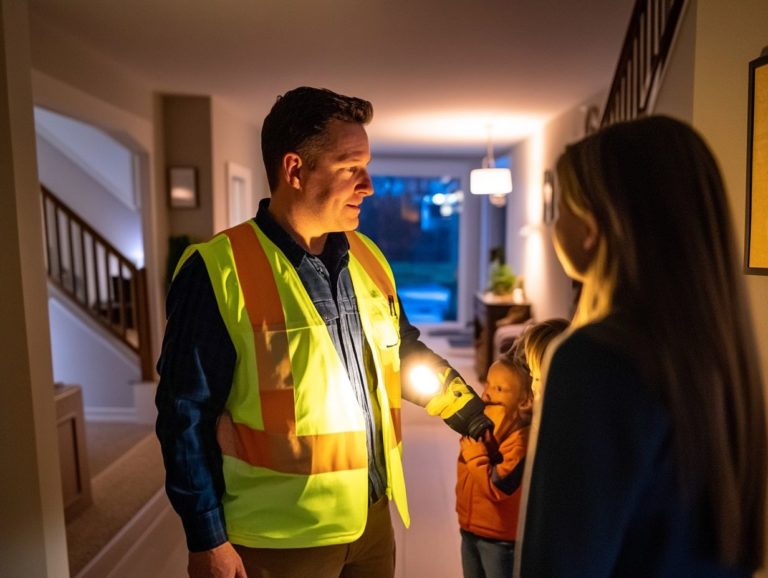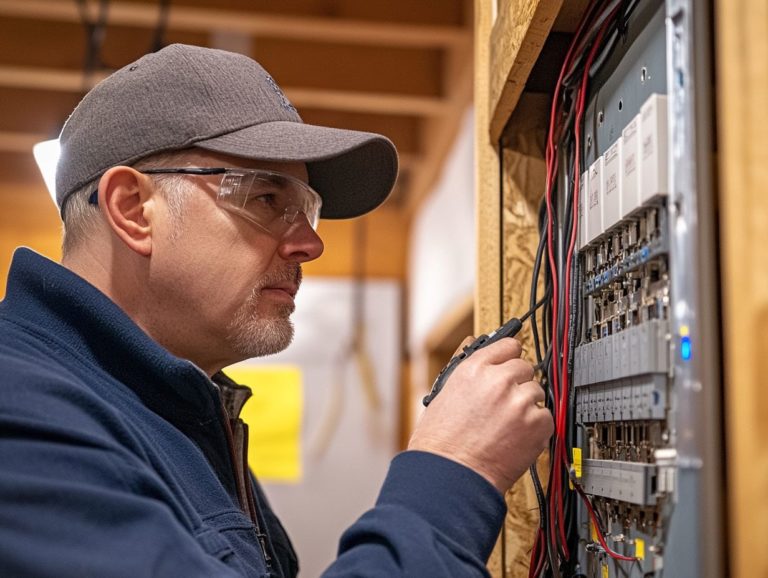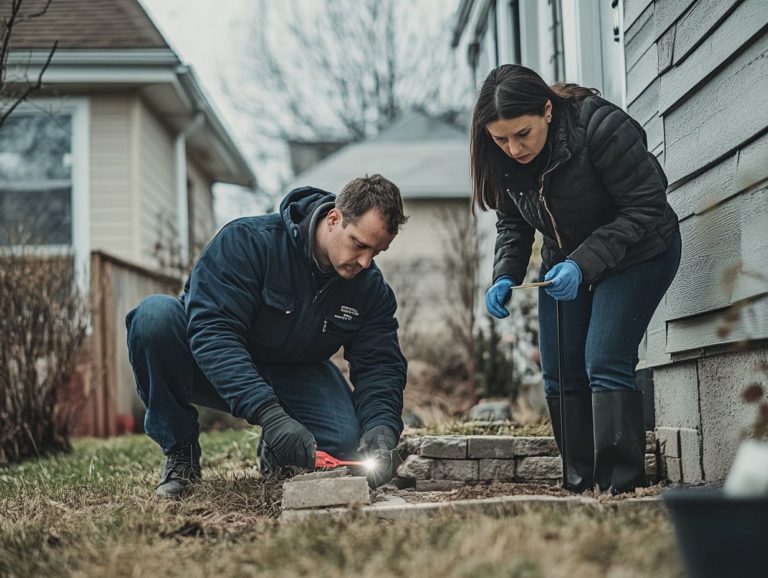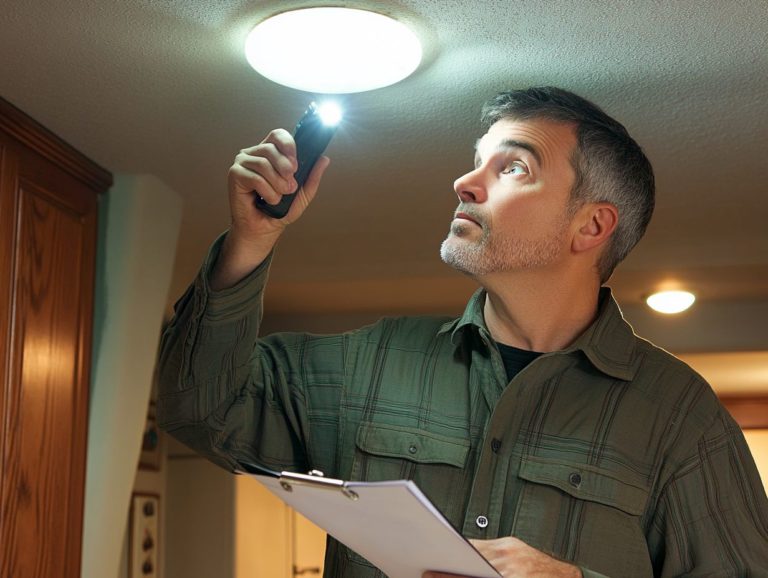How to Choose the Right Inspector for Your Home
Purchasing a home ranks among life s most significant decisions, and ensuring it s a sound investment begins with a meticulous home inspection.
This essential process reveals potential issues and grants you peace of mind as a buyer.
In this article, you ll discover what home inspections encompass, their vital importance, and the key qualities to seek in a home inspector.
You ll also find crucial questions to ask and tips for selecting the right inspector, empowering you to make an informed decision.
Let’s explore the home inspection landscape together!
Contents
- Key Takeaways:
- Understanding Home Inspections
- Qualities to Look for in a Home Inspector
- Questions to Ask a Potential Home Inspector
- Researching and Comparing Home Inspectors
- Making the Final Decision
- Frequently Asked Questions
- What qualifications should I look for in a home inspector?
- How much experience should a home inspector have?
- Should I check references before hiring a home inspector?
- Is it important to attend the home inspection?
- How much does a home inspection typically cost?
- Can I negotiate the price of a home inspection?
Key Takeaways:

Experience and credentials are crucial when choosing a home inspector. Look for a professional with a strong track record and relevant certifications.
Effective communication and attention to detail are key qualities to look for in a home inspector. They should be able to explain their findings clearly and thoroughly.
Don’t solely rely on price when making your final decision. Consider factors like online reviews, recommendations, and your gut feeling, along with knowing how to spot a good home inspector, to ensure you choose the right inspector for your home.
Understanding Home Inspections
Understanding home inspections is essential for you as both a homebuyer and seller. These assessments provide valuable information about a property’s overall condition, highlighting structural and mechanical concerns.
A qualified home inspector conducts a thorough check to uncover hidden issues, including pest infestations, safety hazards, and potential costly repairs. The inspection report serves as a vital tool, guiding you in making informed decisions during the home buying process.
This comprehensive evaluation saves you time and money while offering peace of mind as you invest in a new property.
What is a Home Inspection?
A home inspection helps you understand a property’s true condition. A certified inspector meticulously assesses various elements, from structural integrity to mechanical systems.
This thorough process involves checking the roof, plumbing, electrical systems, and HVAC (heating, ventilation, and air conditioning) units, ensuring that every component functions correctly and adheres to safety standards.
The resulting inspection report is typically well-organized, categorizing findings into major concerns, minor issues, and routine maintenance. This structured clarity enables you, whether you’re a homeowner or a potential buyer, to grasp what s at stake.
Depending on the age and location of the property, the inspector may suggest additional tests, such as radon or lead assessments, to uncover any hidden hazards. Conducting a comprehensive examination is essential for identifying potential issues that could impact both safety and property value.
Why are Home Inspections Important?
Home inspections play a crucial role in your home buying journey, revealing hidden issues that could lead to costly repairs in the future, such as structural flaws or pest infestations.
By providing a thorough evaluation of the property, home inspections enable you to make informed decisions, ultimately protecting your financial investment.
For example, problems like outdated electrical systems or roofing concerns can be identified during the inspection, giving you a clearer understanding of necessary repairs and their associated costs.
Knowing this helps you negotiate repairs or price adjustments with the seller while giving the seller an opportunity to address these issues proactively, potentially sidestepping last-minute negotiations that could jeopardize the sale.
In this way, inspections become an essential tool for ensuring a smoother transaction for everyone involved.
Qualities to Look for in a Home Inspector
When selecting a home inspector, it’s crucial to consider several key qualities that guarantee a comprehensive and trustworthy evaluation of the property. For more insights, check out how to choose the right inspector for your property.
Assess their experience and credentials, as well as their communication skills and attention to detail. Each of these factors plays a vital role in ensuring you receive an accurate assessment of your potential investment.
Experience and Credentials
Choose a home inspector with solid experience and credentials to ensure they can find potential issues and maintain industry standards. For more detailed guidance, check out this resource on how to find a qualified home inspector.
Certifications from organizations like the Better Business Bureau show a commitment to ethics and customer satisfaction. These credentials boost your confidence as a buyer.
Inspectors who pass the National Home Inspector Examination have a strong grasp of building codes and inspection methods. This blend of qualifications helps them spot structural weaknesses and understand home systems.
You ll receive a complete evaluation of the property’s condition. Selecting a qualified inspector is an investment in your peace of mind.
Attention to Detail

Attention to detail is crucial for home inspectors. It influences how thorough your inspection report is and your ability to spot hidden issues.
By analyzing carefully instead of rushing, you can find signs of wear, structural weaknesses, or hazards that others might miss.
For example, a small crack in the foundation can indicate serious problems that lead to costly repairs. Don’t ignore improper wiring or plumbing as they can pose safety risks and require extensive fixes later.
This meticulous approach gives your clients a clear understanding of the property’s condition, protecting them from unexpected costs in the future.
Communication Skills
Effective communication is essential for home inspectors. You must clearly convey your findings to both buyers and sellers.
To make the inspection report understandable, translate complex terms into simple language. Clients often feel overwhelmed by jargon, so breaking down concepts enhances clarity.
Take time to interact with clients. Encourage their questions and provide straight answers to ensure they fully grasp the inspection details.
This open dialogue builds trust and empowers your clients to make informed property decisions.
Questions to Ask a Potential Home Inspector
When interviewing a potential home inspector, ask targeted questions to uncover their expertise and approach. This will help you understand what to expect from the inspection report.
Being informed boosts your confidence in their ability to thoroughly assess the property.
What is Included in the Inspection?
A home inspection involves evaluating various components, including structural concerns and home systems. This ensures you understand the property’s condition and any repairs needed.
The inspection report details the roof’s integrity, plumbing systems, electrical wiring, and HVAC units. Inspectors look for signs of water damage, mold, and the state of windows and doors.
By identifying these issues, you can negotiate repairs with the seller, paving the way for a smoother transaction.
How Long Will the Inspection Take?
A home inspection usually takes two to four hours. It s important to focus on a detailed assessment rather than rushing.
Factors like the size of the home and its age can affect inspection time. Larger homes typically take longer due to more rooms and systems to check.
A dedicated inspector balances efficiency with thoroughness. This diligence ultimately safeguards your investment, giving you peace of mind in your home-buying journey.
Can I Attend the Inspection?
As a homebuyer, attending your home inspection is highly recommended. It lets you ask questions and understand issues directly from the inspector.
Being present allows you to address concerns immediately, gaining clarity on potential issues. This interaction provides a clearer picture than what’s captured in the written inspection report.
Your involvement enables informed decisions, ensuring you thoroughly explore your prospective home’s nuances.
Researching and Comparing Home Inspectors

Finding the right home inspector is crucial. To make an informed decision, consider using online reviews and personal recommendations, and refer to this guide on how to choose the right inspector for your home to help you choose wisely.
Online Reviews and Recommendations
Online reviews help you choose a reliable inspector. Look for detailed ratings and testimonials to see how others have rated their services.
The Better Business Bureau is a great resource for identifying trustworthy inspectors, providing evaluations based on customer feedback.
Utilizing these tools boosts your confidence in the inspection process, ensuring a smoother transaction in your home buying journey.
Interviewing Multiple Inspectors
Talk to several home inspectors to compare their qualifications and approaches. For guidance on finding reliable home inspection services, this helps you spot the best fit for your needs.
By engaging in thoughtful conversations, you can uncover vital insights into their experience and customer service practices.
This thorough approach enables you to make an informed decision, ensuring the inspector you choose will deliver a comprehensive evaluation.
Making the Final Decision
When choosing your home inspector, consider their experience, communication skills, and price. For more guidance, check out how to select a home inspector for your needs. This will ensure you make the best choice.
Considerations Beyond Price
While cost is undoubtedly an important factor when selecting a home inspector, it should never be your sole consideration. The quality of service and the inspector’s experience are just as vital.
Evaluating potential inspectors based on their expertise can profoundly influence your home-buying journey. Additionally, understanding how to choose the right real estate agent can also enhance your experience. Take the time to review previous client feedback, as it often reveals valuable insights into the inspector’s thoroughness and attention to detail.
A detailed inspection report can unveil hidden issues that might lead to costly repairs down the line. By prioritizing inspectors who deliver a thorough account of their findings, you protect your investment and gain invaluable peace of mind.
Recognizing the long-term value of a detailed inspection can significantly enhance your ability to make informed decisions throughout the home-buying process.
Trust Your Gut
Choosing the right home inspector is crucial, and trusting your instincts can lead you to the best fit. Alongside their professional qualifications and communication skills, your comfort level also matters, so consider how to choose the right inspector for your needs.
While qualifications and experience are undeniably important, the personal connection you feel during the interview can greatly enhance your inspection experience. Engaging in dialogue with the inspector allows you to assess their expertise and their ability to address your concerns effectively.
This rapport fosters a collaborative atmosphere, encouraging open discussions about potential issues in the property. Ultimately, a positive interpersonal dynamic can transform what might otherwise be a stressful process into a more manageable and enjoyable experience.
Frequently Asked Questions
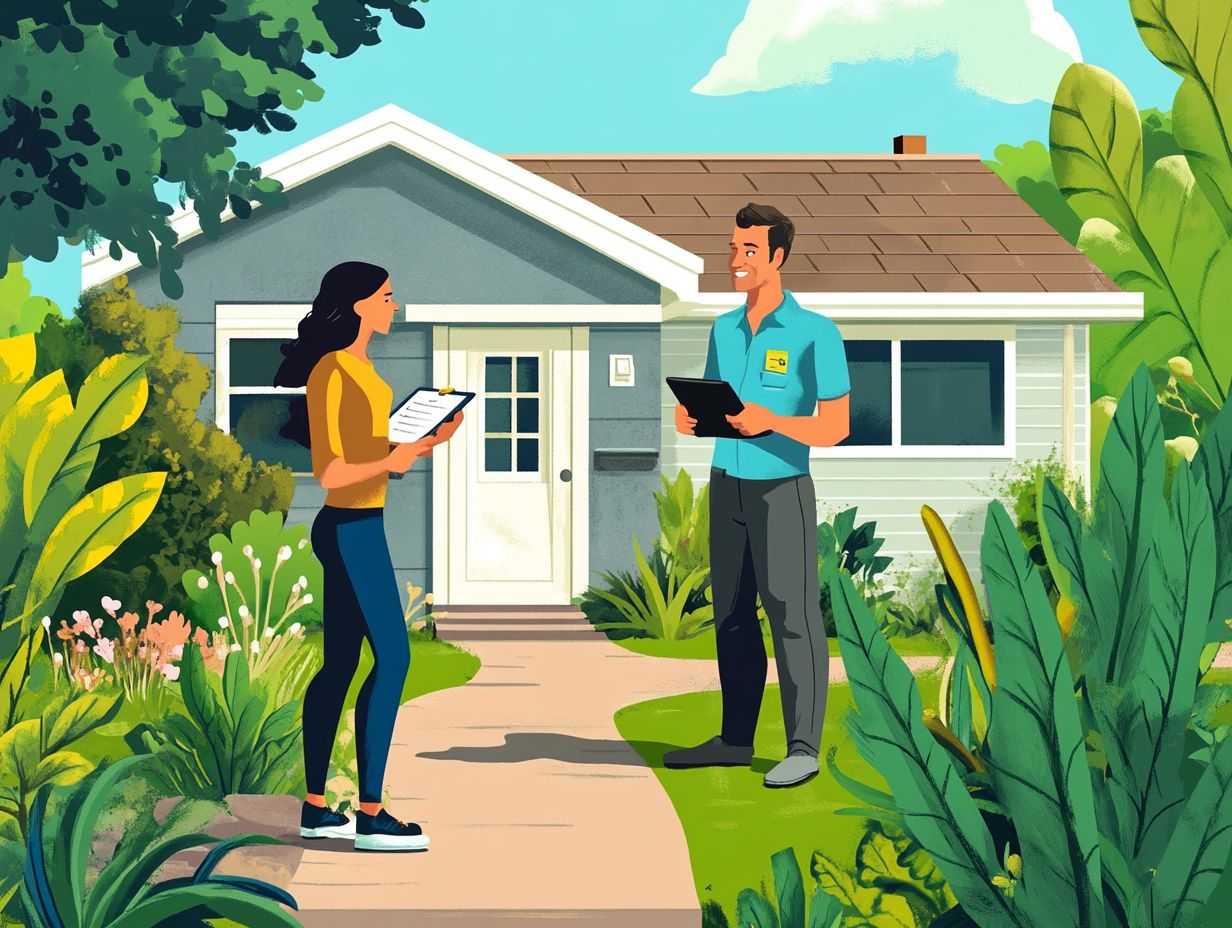
What qualifications should I look for in a home inspector?
You should seek a home inspector who is licensed, insured, and certified by a reputable organization such as the International Association of Certified Home Inspectors (InterNACHI) or the American Society of Home Inspectors (ASHI).
How much experience should a home inspector have?
A good rule of thumb is to choose a home inspector with at least three years of experience. However, some newer inspectors may have extensive construction or engineering backgrounds that make them qualified to inspect homes.
Should I check references before hiring a home inspector?
Yes, it is always wise to check references before hiring a home inspector. Ask for at least three references from previous clients and contact them to inquire about their experiences with the inspector.
Is it important to attend the home inspection?
Yes, it is highly recommended to attend the home inspection. This gives you the opportunity to ask questions and better understand any issues that the inspector may find.
How much does a home inspection typically cost?
The cost of a home inspection can vary depending on the size and location of the home, as well as the inspector’s experience. On average, you can expect to pay between $300 and $500 for a home inspection.
Can I negotiate the price of a home inspection?
While some inspectors may be willing to negotiate their price, keep in mind that a lower price does not always equate to a better deal. It is more important to choose a qualified and experienced home inspector rather than focusing solely on cost.
Now that you know what to look for in a home inspector, don t hesitate to reach out and start your search today!

